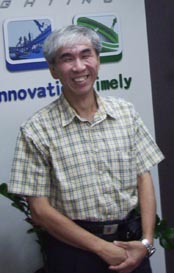Trend Lighting Chairman Sheds Light on Success in LED Sector
2009/10/07 | By Ken LiuAfter 16 years in the light emitting diode (LED) sector, Chairman P.J. Wang of LED-lighting manufacturer Trend Lighting Corp., a Northwestern University materials-science Ph.D., sums up his insight: "You will survive as long as you don't take for granted the LED sector as being a picnic."

Many major businesses in Taiwan are motivated to invest in lighting-module or epitaxy-wafer manufacturing, driven by official incentives to save energy and cut emissions. After seeing many such businesses enter and then quit the LED sector, Wang says that the phenomenon is due to under-estimating the difficulty of the business.
Illustrating Complexity
Often illustrating the complexity of the LED sector by comparing LED chips to silicon chips, Wang says that a silicon chip only conducts electricity while LED chips do more complicated work-converting electricity into light. "Given that silicon is a natural substance whereas LED is synthetic, which makes the yield rate of LED material manufacturing harder to control than that of silicon's. So the average 70-80% yield rate for LED-chip manufacturing is hardly acceptable to silicon-chip manufacturers who are used to yield rates close to 100%," Wang elaborates.
Wang was invited to captain Arima shortly after leaving United in 1998, and set up the lighting business unit at Arima in 2004, taking the LED-chip maker into lighting. "I thought then LED lighting would be the next wave," he recalls. In March 2008, he opened Trend with the team he set up for Arima's lighting unit to design and manufacture LED lighting modules. "My core advantage over others in the lighting sector is my knowledge about epitaxy-wafer manufacturing, which I know is reliable for lighting," he stresses.
Considerable Track-record
Wang has a considerable track-record: while still being Arima's president, his company lighting unit won contracts to supply LED streetlights to the Taipei Mass Rapid Transportation (MRT) lines, a first for a Taiwanese LED maker. The maker also has replaced fluorescent lamps with LED lamps on over 1,000 buses as a supplier for the California State Government, a job that has been taken over by Trend. "We've also supplied the Taichung City government with at least 2,000 LED streetlights," he says.
Truly appreciating the nature of LED lighting has helped Wang to shape business strategies: "We began by developing LED streetlights for official contracts having been trending towards energy-efficiency and durability to help cut governmental power and maintenance bills," he explains. The company has so far focused on streetlighting, downlights, office lighting and bus lighting. "We keep our product line focused to ease quality control," he stresses.
Using Proven LEDs
To ensure top quality and avoid potential patent infringements, the company uses patented LED packages from Nichia and Cree. Finished products are verified at the government-backed Industrial Technology Research Institute (ITRI). "We've not had quality problems so far," Wang boasts.
Trend Lighting's product line includes luminaries as TRENDLITE-510 5W MR16 lamp, 150W streetlight, and GeoLED office ceiling lighting fixture.
TRENDLITE-510 light has different angled reflectors that diffuse light at 30 degrees and 60 degrees, making such light suitable for downlights, track lights, desktop lights, pendants, landscape lights and display lights, all of which are CE and RoHS certified.
The 150W streetlight is rated at over 8,000 lumens, efficacy of 53 lumens per watt, diffusion angle of 150 degrees, and LEDs tested to 50,000 hours, as well as being CE-approved and officially approved in Taiwan to various standards.
The GeoLED light has 49 LEDs, is rated at 2,000 lumens, a diffusion angle of 100 degrees, and a 30,000-hour warranty, including being CE marked.
This maker is also working on new lighting for freezers and wardrobes.
Trend Lighting has at least 20 patents, thanks to the maker's 15 R&D specialists, including the one for the photo-sensitive controller for bus lighting, making automatic control of interior bus lighting easy according to ambient conditions.
Caption 1: Trend Lighting Chairman P.J. Wang.
Caption 2: TRENDLITE-510 MR16 gives off even-diffused light.




